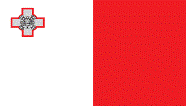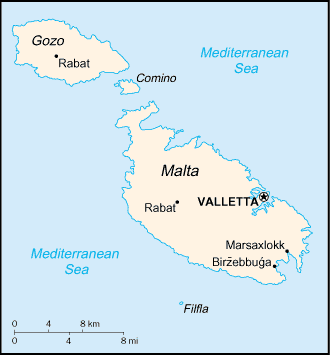|
Malta
|

|
Capital: Valletta
Population: 440,372
Brief History of Malta:
Malta is a small island nation in the middle of the Mediterranean Sea. Malta has a rich history with some of the world's oldest free-standing architecture. The Phoenicians and the Carthaginians both built ports on the island. Later, the island became part of the Roman Empire. It is also famous as the place where Saint Paul from the Bible was shipwrecked.
The island continued to change hands over the centuries. In 533 AD it became part of the Byzantine Empire and then, in 870, it was taken over by the Arabs. In 1090, Count Roger of Normandy drove out the Arabs and the Normans took control.
In 1530 Charles V gave the island to the Knights of St. John. They became known as the Knights of Malta. The Knights of Malta built up the island including towns, forts, and churches. They maintained control until Napoleon and the French arrived in 1798. With the help of the British, the people of Malta were able to expel the French in 1800. They joined the British Empire in 1814.
Malta played an important role as a naval and military base during both world wars. In 1964 Malta became an independent nation and joined the European Union in 2004.
The Geography of Malta
Total Size: 316 square km
Size Comparison: slightly less than twice the size of Washington, DC
Geographical Coordinates: 35 50 N, 14 35 E
World Region or Continent: Europe
General Terrain: mostly low, rocky, flat to dissected plains; many coastal cliffs
Geographical Low Point: Mediterranean Sea 0 m
Geographical High Point: Ta'Dmejrek 253 m (near Dingli)
Climate: Mediterranean; mild, rainy winters; hot, dry summers
Major cities: VALLETTA (capital) 199,000 (2009)
The People of Malta
Type of Government: republic
Languages Spoken: Maltese (official), English (official)
Independence: 21 September 1964 (from UK)
National Holiday: Independence Day, 21 September (1964)
Nationality: Maltese (singular and plural)
Religions: Roman Catholic 98%
National Symbol: Maltese cross
National Anthem or Song: L-Innu Malti (The Maltese Anthem)
Economy of Malta
Major Industries: tourism, electronics, ship building and repair, construction, food and beverages, textiles, footwear, clothing, tobacco
Agricultural Products: potatoes, cauliflower, grapes, wheat, barley, tomatoes, citrus, cut flowers, green peppers; pork, milk, poultry, eggs
Natural Resources: limestone, salt, arable land
Major Exports: machinery and transport equipment, manufactures
Major Imports: machinery and transport equipment, manufactured and semi-manufactured goods; food, drink, tobacco
Currency: Maltese lira (MTL)
National GDP: $10,830,000,000
** Source for population (2012 est.) and GDP (2011 est.) is CIA World Factbook.
Back to Geography Home Page
